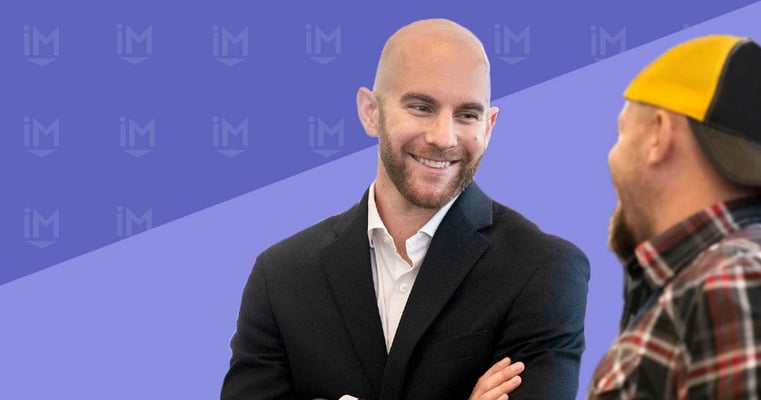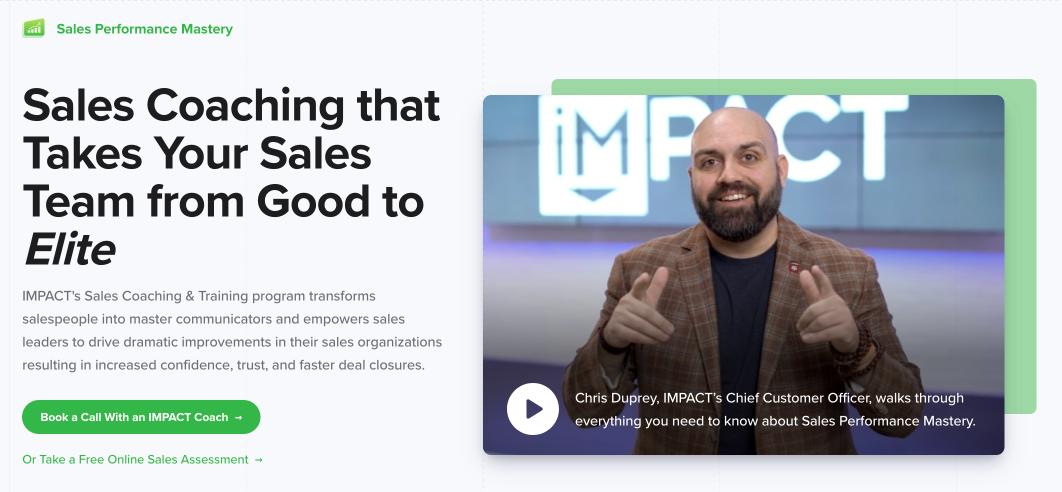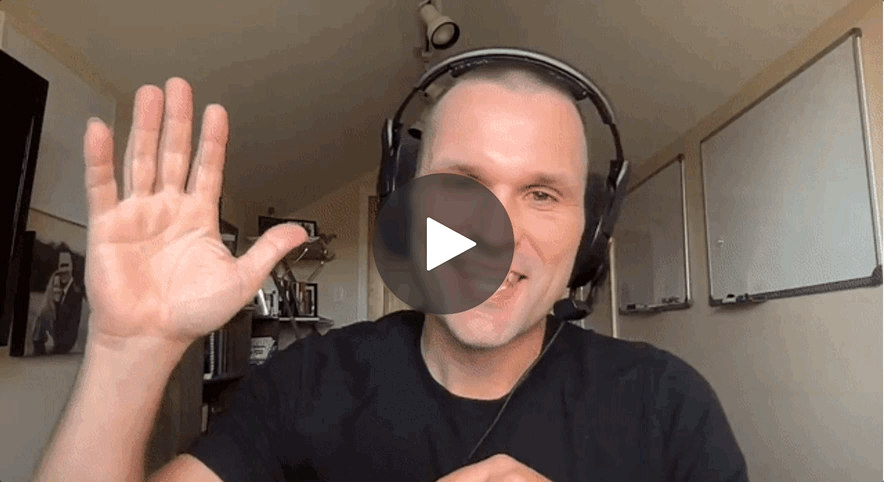Subscribe now and get the latest podcast releases delivered straight to your inbox.
Video Marketing: What Your 2025 Business Video Strategy Must Include

Dec 18, 2024

Business video strategy checklist
- Hire an in-house videographer
- Add video to your website
- Use video in your sales process
- Create live video
- Host virtual events
January gets all of the attention when it comes to New Year’s resolutions — mostly because so many of us give up before the month is through, falling back into comfortable old habits and waiting until next year to really change.
But the key to starting something new is to focus less on the goals and outcomes, and more on the processes and beliefs that will get you there. As James Clear writes in Atomic Habits, “It’s hard to change your habits if you never change the underlying beliefs that led you to your past behavior.”
All too often, businesses hold back from fully committing to video marketing because of underlying beliefs that are hard to shake:
- Video is too expensive.
- Video production, especially post-production, is slow and labor-intensive.
- Video content is hard to update.
- My team won’t want to be on camera.
Only when we change these beliefs can we truly change our habits — and the outcomes will be worth it.
The truth is that in 2025 video production is cheaper and more efficient than ever before. But more important than that is the fact that your customers expect video from your brand. They almost require it. At the same time, video builds trust with your audience in a way that no blog post or website copy can.
James Clear | Atomic Habits
In 2023, more than half of all businesses used video in their marketing, and the frequency and speed of production continued to climb. In fact, 96% of marketers recognize video as a vital component of their marketing strategy.
And video is not just for marketing. Nearly a third of businesses use video in their sales process, and this results in shorter sales cycles and higher close rates.
Experts have predicted that video now makes up more than 65% of all internet traffic, so if you’re not embracing video now, you’re in danger of falling behind.
But not to worry. In this article, I’m going to break down what should be in your 2025 business video strategy, whether you’re a total novice or a video veteran.
Remember though, video creation is a commitment. You can’t just make one or two videos and be done. We recommend developing a culture of video within your organization so that video content becomes a part of everything you do — from your marketing strategy and sales process to communication within your business.
The points I will lay out below are meant to deliver quick wins and long-term results, provided you commit to producing video content.
In this article, I’ll cover:
- Business video strategy for newbies (including hiring a video producer, planning a video strategy, and using video in the sales process)
- Business video strategy for veterans (including live video, virtual events, and video podcasting)
In other words, there will be something for everyone. Let’s dive in together.
Part I: Business video strategy for newbies
New to video production? This is where you should start.
1. Hire an in-house videographer
Video marketing is not an initiative that can be divided among the rest of your sales and marketing teams. Video is a process that requires the total attention of at least one person.
Think about it: Video creation is an intricate, multi-step process. To create one marketing, sales, or social media video, you first need a strategy that details exactly what the video will be used for, who the intended audience is, and where it will be hosted. Next, you need to have a script — or at least an outline — that’s been written and approved before you’re ready to shoot.
Then, you have to complete the shoot, including set up for lights, camera, microphones, staging, and backdrop.
Once the gear is set up and ready to go, you need to shoot the videos themselves, checking everything and troubleshooting along the way.
Once that’s complete, it’s time for post-production. Editing is more than just putting all your clips together. An experienced editor will mix the audio tracks with music and color correct your clips, all with proficiency and precision using pro-level editing software.
Clearly this is a big job — and we haven’t even factored in company-wide meetings, travel if you have multiple locations, approval of the content, and publishing.
To get all this done with any kind of efficiency, your 2022 business video strategy needs an in-house videographer.
How to hire a videographer
Your videographer (or video producer) will be your in-house storyteller. Therefore, you should approach hiring this person with the mindset that you’re looking for both hard and soft skills. This person needs to have the hard skills necessary to film, edit, and publish high-quality videos, as well as the soft skills to make colleagues feel comfortable on camera and plan marketing strategy.
This hire is critical to the success of your video marketing initiative.
By hiring a videographer, you’re committing to doing the work properly, and ensuring that you have a resource on your staff for the long-term success of your business video strategy.
2. Plan to add video to your website
Your website is a vital sales tool. As far back as 2019, we recognized that 70% of consumers made up their mind on what they wanted to purchase before they talked to a salesperson. How do they come to these decisions? By self-educating with the materials they find online — whether it be written content, videos, or product reviews, which they find through search engines.
This is why the website as we know it has been promoted from a virtual brochure to your most talented salesperson.

In 2023, the average person watched 17 hours of online videos per week.
By adding videos to your website, you’re giving visitors to your site the opportunity to self-select which media type they would like to consume to learn about your product or service.
'The Selling 7'
What type of videos should you be putting on your website? Start with what we call The Selling 7. These videos speak to your target audiences and help them understand your product or service — and what your company stands for.
- 80% videos are educational videos that answer the top 7-10 sales questions that come up on nearly every sales call. By addressing those basic questions in advance, your sales appointment will be more productive and focused.
- Product or service fit videos explain an individual product or service, as well as who is (and who is not) a good fit for it. By eliminating the bad-fit prospects, your sales team will waste less time on prospects who were never going to buy from you anyway.
- Cost and pricing videos offer a direct explanation of price — as well as the factors that make that price go up or down. Money is on every buyer’s mind, and addressing cost openly shows them that you’ve got nothing to hide.
- Customer journey videos (or customer testimonial videos) tell a story of a past customer. These videos give a customer the opportunity to see someone else facing the same problems as they are, and see how you solved it for them. Customer journey videos provide valuable social proof and relatability.
- Claims we make videos allow you to show proof of the promises you make to your customers. Do you use top-grade materials? Show it. Do your people go the extra mile for your customers? Show it. Don’t say that you’re the best. Show what makes you the best.
- Employee bio videos introduce your team to your customers. These videos humanize your company and begin to establish trust. Buyers are made to feel more comfortable when they can see a face and hear a voice.
- Landing page videos accompany any form or download that appears on a landing page. These videos address questions and alleviate fears. If someone is concerned about giving you their information, for example, this video reassures them.
Once you understand these types of videos, you can start to plan where to use them on your website.
Create a diagram of your website, starting with your homepage, and accounting for all the pages in the ideal path you’d like visitors to take once they leave the homepage.
Once you’ve finished that diagram, with your videographer, place The Selling 7 topics on the diagram where they fit the best. For example, all your landing pages should have a landing page video.
Then, begin to prioritize. What are the high traffic conversion paths that could benefit from a video?
This way, you can produce as many videos as you need — and place them exactly where they’ll do the most good. Then, evaluate video performance and tweak and update as necessary.
3. Utilize video in your sales process
Sales has changed. Even before the pandemic, we were shifting toward a virtual sales economy. Now, that change has been ingrained in our culture. Today, you can buy nearly everything online, and video calls are replacing boardroom meetings in every industry.
But no matter the platform, sales success comes down to trust.
Salespeople are often the last people that you want to talk to even on a good day, so building trust and humanizing them for your buyers is a must.
Video can do that.
As many as 90% of customers say that watching a video on the product helped them make a buying decision, and 75% of prospects in the latter phases of the sales process are more likely to close after receiving a personal video message.
There’s no doubt video can help your sales process. The hard part is getting started.
Start with 1-to-1 and 1-to-many videos
I recommend training your sales team to use 1-to-1 and 1-to-many videos in the sales process.
These types of video deliver a personalized, custom message to a prospect — and they can be easily created using a phone or computer. Your sales team can send a unique message to a single person (or group of people) that conveys information about what they can expect during the sales process. These videos are not highly produced. In fact, the lower production quality is an asset in this case because it makes the video feel authentic and friendly.
This tactic builds trust by introducing your sales team to people they’ve never met before, providing a human element to your communication, and adding faces and voices to the text of an email.
Instead, there's a GIF like this and a personalized message that offers richer connection.

Beyond 1-to-1 videos, how else can video improve your sales process?
Remember the 80% videos I mentioned above? This is where they are very effective. Before a sales call, a salesperson can send a prospect an 80% video to clear up the most common questions every customer asks. Then, in the meeting, the conversation can be more productive, since the video has gotten many questions out of the way ahead of time.
Your videographer should have frequent conversations with your sales team to learn about the fears, concerns, and questions they’re hearing from buyers.
Part II: Business video strategy for veterans
If you glanced over the first section and found yourself saying “Check, check, check,” this next section is for you.
If you’re reading this section, that means you feel confident in the way you use video on your website. You’ve probably got a bevy of high-quality marketing videos — as well as a fully-realized video production process.
You might even have a YouTube channel complete with brand videos, how-to videos, and other high-quality video content.
The following suggestions are the cherry on top of the video strategy cake.
1. Explore live video to connect with customers
Internet users consume billions of hours of live-stream video content each year. All the major social media platforms at this point have embraced live video.
This trend is only going to increase in the years ahead, so live video could be a great way for you to reach your target audience.
Live video, whether on Facebook, Instagram, YouTube, LinkedIn, TikTok, or other social media platforms, can be a way of connecting with your audience through an authentic medium. As things are live and can’t be edited, viewers feel like they’re getting a more genuine glimpse at who your brand is and what it will be like to work with you. In the age of AI and deepfakes, authenticity is more important than ever.
There are many platforms to choose from, but I would recommend focusing on the platform your brand gets the most engagement on.
2. Host virtual events
Bigger than launch parties are full-scale virtual events. These can replace in-person events with an equally valuable experience. At this point, HubSpot has hosted two virtual INBOUND events, each with thousands of attendees, dozens of speakers, and many different kinds of video footage, from live AMAs to pre-recorded sessions to virtual networking events.
Amid the pandemic, the number of virtual events doubled, and even before that, virtual events were steadily growing in popularity.
Why is a virtual event compelling?
Well, you can invite speakers from all over the world. Inviting speakers from outside your organization who have their own raving fans allows you to organically make a connection with someone who may not have heard of your business otherwise. Think of the opportunities to network with potential prospects or potential partners at another virtual event.

It also opens up your audience to people in different geographic locations who may not have been able to attend in-person events previously. Another consideration, even beyond the pandemic, is the cost savings.
When it comes to virtual events, there are no costs for travel, hotel rooms, renting spaces, food, and more. Though you have to pay for the platform, the cost is significantly less. You can pass this savings on to your attendees, while still turning a profit for your business.
Bonus: A video podcast
If this is something you’ve always wanted to do, now is the time to jump in. Podcasting has consistently shown growth over the years, and in 2025 things kept trending upward.
Research shows that three out of four podcast listeners tune in to learn something new.
With that being said, and with the number of podcasts there are to consume in the world, you can no longer get away with having mediocre content. A video podcast is a great way to stand out.
Generally, podcasts are created live-to-tape, which basically means shows are recorded with the intent that they could go live at the time of recording. Going from “podcast” to “video podcast” should not be too difficult.
IMPACT's video podcast
To get started with your video podcast, you first need to decide what the format of the show is going to be. Is it going to be interview style or talking head? Are you going to have recurring segments? Are you going to have a guest every week?
The frequency of podcasts matters as well. As a video podcaster, you’ll likely be posting your content on a platform like YouTube or Facebook. Both platforms value frequency of posting, and on YouTube, if you create new playlists with your podcast content, that counts toward your unique content creation.
A video podcast captures all of the biggest humanizing and engagement benefits of video content in general, but I only recommend starting a video podcast if you have a clear vision of how it fits into the rest of your marketing strategy and of how you can consistently deliver this content.
The video and audio quality also have to be top-notch. Check out this set of tips for setting up an office studio.
Building a video marketing strategy that goes beyond 2025
Now that I’ve laid out a roadmap for you in 2025, it’s time to get to work.
One of the things you can decide on is what you are going to focus on first. Whether you’re a video newcomer or a video veteran, there’s always something you can be doing when it comes to video.
Remember one thing: It all comes back to building trust as a brand. For any video metrics you track, try to connect them back to that one central tenet: Is this video building trust with my audience?
By adding everything mentioned above into your 2025 business video strategy, you will be better equipped to accomplish this goal and see the leads and deals that come with it. Your marketing funnel will be full of well-educated prospects who are qualified for your products or services.
When you create videos with this goal in mind, you set yourself up for a great 2025 and beyond.


Order Your Copy of Marcus Sheridan's New Book — Endless Customers!